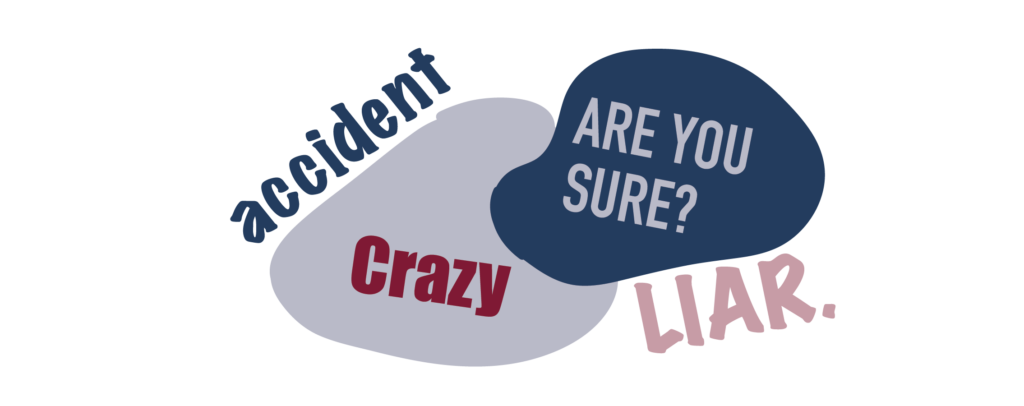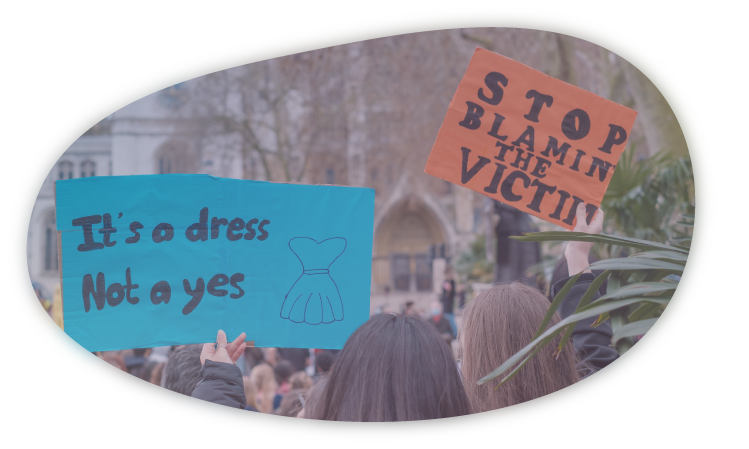There is a growing phenomenon reported by many social media users on TikTok of individuals realizing that they were sexually assaulted months or even years after it happened. What has been prevalent within these situations is the fact that the perpetrator is often a significant other or someone close within the survivor’s life. To give you a greater understanding of the videos, the creators set the scene of a regular day cooking or simply sitting in class. Suddenly, they are struck with the realization that they were sexually assaulted months or years ago. It’s not that they necessarily forgot that the event took place, it’s that they didn’t understand or realize the behaviour was actually sexual assault. These videos sometimes have a trigger warning, but there are times where they aren’t included.
Many people realize that they have been assaulted, later in life. It can be beneficial to have an understanding of why this occurs for healing, and peace of mind. We have listed some possible reasons below, but it’s often different for many people so don’t worry if you don’t relate to any of them.
The halo effect is when we see a person in such a positive light, that our minds convince us they can do no harm. This tends to be a common occurrence within romantic relationships. It’s very easy to be blinded by love, and if gaslighting or manipulation is happening it can be even more challenging to spot sexual assault. In some cases, many individuals may deem the sexually abusive behaviour as normal because they are already intimate with their partner. On the other hand, growing up in certain environments where masculine power is the dominant force, sexually abusive behaviour may feel normal. However, there is a fine line between initiating intimacy respectfully and abusively. Just because you’re romantically involved doesn’t make it okay for your partner to demand sexual acts of you. The halo effect can also occur with other very close people in your life, and doesn’t necessarily have to be a romantic relationship (i.e perpetrator could be a close friend). It’s hard to know how to react when someone you care deeply about does something that hurts you. You may want to convince yourself that nothing wrong happened, as this relationship is one you hold close to your heart.
Consent is not consent if you feel scared to say no. A lot of survivors will often feel guilty calling something assault if they said yes, or simply didn’t say anything at all. They believe that because the word “no” was not spoken they can’t call what took place sexual assault. However, that is far from the truth. It’s important to recognize that our society has placed a lot of pressure on the word “yes,” when in reality it means nothing if it was said out of fear and coercion. So, for years or months you may convince yourself that because you didn’t fight back or say no, that what you experienced would not classify as sexual assault, even if it was. This is a result of wrongful education, and in no way should you feel guilty or ashamed.

A lot of people who decide to report sexual assault to a friend, family member or legal team are often victim blamed. This means that the survivor is told that what took place is their fault (but we know sexual assault is never the survivor’s fault). If someone is told that their experience is invalid, then they may disregard what took place and believe the false narrative others have created for them. You may realize later in life that what these individuals told you was false, and that you did in fact experience sexual assault but were convinced to blame yourself for what took place.
Common phrases of victim blaming include the following:
“Weren’t you drunk?”
“Are you sure that happened?”
“Maybe it was a misunderstanding.”
When we are put in a stressful or traumatic situation, our bodies enter a mode of survival. You may become so focused on remaining safe that what takes place in the moment becomes less important to pay attention to. In other cases, you may try to block the memories out of your mind because they are simply too painful to re-hash, and when you do go back to think about it you fear you can’t trust your judgment. Overtime, these memories can re-surface, and you may no longer be able to stay in denial or avoid what took place. For more information on this, check out our articles, Why Can’t I Remember a Sexual Assault? and How the Brain is Affected during Trauma.
Managing this new realization can be challenging and overwhelming to take in. Even if what took place happened years ago, your mind is still processing and healing from the information you’ve now discovered. Be gentle with yourself, and know that none of what you experienced is your fault. These are a lot of emotions to unpack, which is why it’s important to be patient during your healing process, and do what is best for your mental health. Below, we provided a few strategies and steps to take after coming to this realization. We also recognize that these aren’t the only reasons one may realize they were sexually assaulted months or years later. If we missed anything you may be feeling, that doesn’t mean what you experienced isn’t valid.

Resources (NOTE: may be triggering as they discuss sexual trauma)
https://www.healthline.com/health/was-i-raped#how-to-tell
Neurobiology of Trauma
How Trauma Changes the Brain
Free Helpline: https://hotline.rainn.org/online
Written by: Taryn
[wpdiscuz-feedback id=”5bidzkt5m1″ question=”Please leave your feedback on this post.” opened=”0″][/wpdiscuz-feedback]
The team at Vesta wanted to use this Pride Month as an opportunity to educate ourselves and others, advocate and celebrate queer joy within the *2SLGBTQIA+ community.
*2SLGBTQIA+ = Abbreviation stands for Two-Spirit, Lesbian, Gay, Bisexual, Transgender, Queer/Questioning, Intersex, Asexual, and ‘+’ aims to include those who identify as non-binary, gender fluid, pansexual, polyamorous, demisexual, and many more.
Today, many of us recognize Pride Month as a big celebration, but let’s begin with a brief history lesson on how Pride Month came to be and what exactly it is that we are celebrating.
Each year we celebrate Pride Month throughout June to commemorate the Stonewall Uprising, which was a catalyst for the Gay Liberation Movement to repeal discriminatory laws and policies against *LGBTQ+ individuals in the United States. It began when a popular gay bar in New York City, the Stonewall Inn, had been raided by police on June 28, 1969. Then, police raids of gay bars were quite common, but this time the individuals at the Stonewall Inn fought back in protest of police harassment and persecution of LGBTQ+ individuals. It is essential to recognize that the individuals at the forefront of the fight for LGBTQ+ rights and who paved the way for today all began with queer people of colour. To name a couple – Marsha P. Johnson, a Black trans woman, sex worker and activist who spent her entire life fighting for equality, was the first person to protest at the Stonewall Inn. Alongside Marsha P. Johnson was Sylvia Rivera, a queer, Latina, self-identified drag-queen, who fought tirelessly for transgender rights.
Pride Month is dedicated to uplifting queer voices, celebrating queer culture, and supporting the rights of queer individuals. It is a combination of political activism and a celebration of all that the 2SLGBTQIA+ community has achieved over the years.
Throughout Pride Month, some common occurrences include Pride Parades, marches, protests, art and culture performances, memorials, and celebrations of life for community members who have lost their lives, especially in the fight for justice.
As we make our way through Pride Month, it is essential to acknowledge the violence and unjust circumstances that the 2SLGBTQUIA+ community faces have not disappeared. Though we see sexual violence occurring in all communities, 2SLGBTQIA+ individuals are disproportionally at higher risk of experiencing violence and receiving less aid post-trauma.
As per stats found at http://ow.ly/ktAE50F1q72 and https://bit.ly/3fJnYOd

This is a non-exhaustive list. Everyone deserves to celebrate their pride in whatever means they wish. Remember to share your pride not only during Pride Month but 365 days a year every year because queer lives deserve to be seen, uplifted, and celebrated always.
Stay safe, and happy Pride Month!
– Vesta
Sources:
https://www.jcfs.org/response/blog/history-pride-part2
https://www.the519.org/education-training/glossary
https://www.instagram.com/p/CQCReSSh5gx/
https://www150.statcan.gc.ca/n1/daily-quotidien/200909/dq200909a-eng.htm
https://www.cp24.com/news/lgbtq-canadians-more-likely-to-experience-assault-than-heterosexuals-survey-1.5098185?cache=wpwecmoua%3FclipId%3D1920563
https://www.health.com/mind-body/different-pride-flags-what-they-represent
Music is an extremely effective way to reduce stress, anxiety, depression, and physical pain while boosting creativity and concentration. Have you ever plugged in your headphones while zoning out to the sound of your favourite song? Suddenly, you’re relaxed and content. Perhaps, you need a sudden boost of energy and turn on a motivational playlist. Many of us can feel ourselves slowly revitalizing after the music’s lyrics and sounds begin to play. Researchers from the University of Nevada, Reno, found that listening to music can change brain functioning to the same extent as medication. So, let’s look deeper into using music for mental health and healing.
You may be wondering if there’s a specific genre of music that has these effects or the length of time you should listen to it for, and how to implement it in your routine. Well, there’s a plethora of techniques when it comes to music and therapeutic effects. You can actually attend music therapy with an individual certified within that field. They are often trained in running sound baths (not an actual water bath) and other activities that have a healing effect on the body through music. However, we recognize that finding a licensed music therapist isn’t always accessible, given everyone’s unique circumstances. So, that’s why we’re here to help guide you through using music as a way to heal yourself as a part of your daily routine.

You’ll want to gear the type of music you listen to depending on your mood. Below we’ve created a chart that can help you choose the best type of music for your current state of mind while also including links to examples of each sound.
| Emotions/Moods/Feelings | Type of Music/Sounds | Effects | Examples of Music |
| Anxiety, Stress, & Panic. | * Light Jazz, Classical, drums, & flutes. * If you prefer lyrical music, something slow that still distracts your mind would be beneficial. (i.e Frank Sinatra, who is known to have calming effects. But, whichever your preference is, don’t feel confine-d to these options!) | * Soothing effects, slows down heart rate, decreases blood pressure, & calms down racing thoughts. | Classical Music: https://www.youtube.com/watch?v=qf5bhXT18rM Frank Sinatra Full Album: https://www.youtube.com/watch?v=q3RYlUqDkb8 |
| Depression | * Energetic, upbeat tunes, empowering lyrics. * The most effective genres of music for depression are rock, pop, hip/hop, rap, reggae, and country. | * Improves mood, helps one feel happier, and energetic. * Can help cope with upsetting thoughts and feelings. | 20 Songs To Help With Depression/Anxiety https://www.calmsage.com/songs-to-help-with-depression-and-anxiety/ |
| Physical Pain | * Slow, soothing music is best for pain reduction. * Classical is a great choice, as well as upbeat pieces if you notice that helps you too. Similar to anxiety, anything that can help distract the mind is a great choice. | * Decrease in painful symptoms. * When you’re not thinking about the pain, you won’t feel it as much. | “The Blue Danube Waltz” (proven by scientists to have positive effects lessening pain) |
| Creativity/Focus | * Classical which has various genres such as contemporary, romantic, baroque and renaissance. | * Listening to classical music is known to enhance studying, creativity, and productivity. | Mozart Unlock The Creative Spirit https://www.youtube.com/watch?v=ZywGDo6UY_M Happy Classical Music https://www.youtube.com/watch?v=JCbaIOz9NOA |
| Sleep | * Meditation type music, rain flowing, ocean waves *contemporary classical, piano, slow/chill music such as jazz or even pop. | * Lowers heart rate, relaxes body, releases dopamine which can help ease you into a comfortable sleep. | Disney Relaxing Piano Collections. https://www.youtube.com/watch?v=rvokdsrwfQg 4 Hours Relaxing and Peaceful Instrumental Music https://www.youtube.com/watch?v=CcsUYu0PVxY |
You don’t have to spend hours listening to music to gain the positive benefits. One hour a day is sufficient and likely to have great effects on your mental and physical health.
So, use music to relax and implement it in whichever way you like for self-care. You can be cleaning, studying, sleeping, or working out when listening to music. There is no need to confine yourself to one spot. Use your creativity and whichever way works best for you when using music for mental health. For more information on engaging in music therapy, we’ve provided some resources where you can participate in that practice.
Written by: Taryn Herlich

Sources:
What is music therapy?
https://www.healthline.com/health/sound-healing
Resources:
https://www.prevention.com/life/a20463031/how-music-heals/
Everyone has different ways of healing; there is no one “right way.” Sometimes we find comfort in those around us and sometimes we simply find comfort in our own homes. Regardless of how we choose to heal, one thing remains common; we seek justice for what has been done to us. While the obvious solution to seek justice may be to rely on state-controlled institutions, such as prisons or courts, that may be difficult for many. Often times, by relying on these institutions, the victim can be re-traumatized having to explain the details and painful events over and over again. This is not a remedy. It is important to note that while many of us choose not to inform the police, certain communities cannot call the police. This rejection of state-controlled institutions stem from distrust in police from marginalized communities, including black, indigenous and people of colour.
This is where the idea of transformative justice comes in. This process aims to “transform the conditions that enabled the harm, and at the same time repair the harm by prompting healing, accountability, resilience and safety for all those who are involved.” Broadly speaking, transformative justice means “making things right.” It means addressing harms in a safe and comfortable manner. There are three key components of transformative justice that make it an effective method of healing.
The first is a trauma-informed and survivor focused healing. This means that it is important to support survivors in regaining their freedom, confidence and autonomy in an informed manner. Survivors must be given opportunities to decide what and who helps them with their healing, instead of imposing our views on them. This is a crucial aspect because it demonstrates that there is an attempt to listen to the survivor and understand their voice.
The second approach is collective action and community healing. Everyone comes from a different background. We are all diverse in nature and our different identities shape who we are. Community accountability means transforming the way we respond and react to sexual violence. It is about asking those difficult questions and addressing the root causes that have perpetuated these harmful environments. By working together as a community to understand violence better, there is a greater desire to provide a supportive and safe space for all. This form of justice invites us as a community to address supremacy, heterosexism, misogyny and other harmful concepts.
The third approach is recognizing and accounting for cultural differences. Not all of us will approach a problem in the same manner. Our insecurities, habits and uncertainties will impact the way we speak to our community and this is a factor that needs to be accounted for when working on communal change.

Transformative Justice looks different for everybody. For instance, if a woman who has been abused is seeking remedy there are certain steps one needs to take the address the harm. The first would be to ask if they are comfortable speaking. By asking questions such as “Do you need some water” or “Do you need some space” are very helpful and indicate a survivor focused approach. The next step would be assessing what happened or how they believe they have been impacted. Questioning them about what the desired outcome would look like for them is also quite beneficial. The last step in this process is the most difficult. This step entails deciding what measures the community will take to address these systemic harms and how they will approach it. This could include having meetings as a community or engaging in mediation practices.
Transformative justice can be very powerful. It allows us to communicate and heal as a whole. However, it has been said that sometimes our communities may be just as harmful as state responses. Our communities are not always perfect, and they can in fact preserve feelings of shame, stigma and victim blaming. After survivors come forward, these may be the responses they are greeted with and once again, there is no accessibility to a safe space for them. It is crucial to encourage survivors to come forward so corrective measures can be implemented. Eradicating stigma and shame must be a priority for all communities and by actively working together as a group, these results can be achieved.
Transformative justice is not a perfect solution. There is always more work to be done and it is a process. We are consistently learning throughout the journey and working to become better versions of ourselves. Although transformative justice is only one way to make change and address harms, it is a step in the right direction.
Sources:
https://www.calcasa.org/2017/04/what-does-transformative-justice-look-like-survivor-focused-trauma-informed-community-accountability-to-ending-sexual-violence/
https://www.teenvogue.com/story/transformative-justice-explained
https://www.sace.ca/learn/transformative-restorative-justice/
https://transformharm.org/transformative-justice-a-brief-description/
Written by: Shreeya Devnani
Legal Disclaimer:
Our website provides general information that is intended, but not guaranteed, to be correct and up-to-date. The information is not presented as a source of legal advice. You should not rely, for legal advice, on statements or representations made within the website or by any externally referenced Internet sites. If you need legal advice upon which you intend to rely in the course of your legal affairs, consult a competent, independent attorney. Vesta Social Innovation Technologies does not assume any responsibility for actions or non-actions taken by people who have visited this site, and no one shall be entitled to a claim for detrimental reliance on any information provided or expressed.
The effects of trauma can be influenced by many different internal and external factors, so what you may be feeling will vary significantly from another person. All feelings after sexual trauma are valid.
Studies show that between 17% and 65% of women who were sexually assaulted in adulthood exhibit symptoms of post-traumatic stress disorder (PTSD).
Post Traumatic Stress Disorder can develop following a traumatic event and is diagnosed by a physician. The symptoms of PTSD can be categorized physically and psychologically.
Physical symptoms
Psychological
Kristen R. Choi, PhD, a registered nurse and researcher at UCLA who studies trauma explains that trauma is different for everyone, but two of the more common reactions are feeling very strong emotions or feeling little.
You might have overwhelming negative emotions or not be able to stop crying. On the other hand, you might feel numb and unable to experience pleasure or pain.
It is also not uncommon to feel guilty or ashamed after trauma has sunk in. For example, you might think you didn’t react the way you should’ve. That’s normal, but if those feelings linger for more than a few weeks, you should look for help.
On the other hand, you might behave in unexpected ways after trauma. For example, some people engage in more risk-taking behaviours, which might seem unusual, especially if you’ve just survived a situation where your life was in danger, but it’s a normal reaction.
“If you feel like the trauma you experienced is making it hard for you to live your life — for example, do your job, experience pleasure, or have healthy relationships — it can be a good idea to seek professional help”
Kristen R. Choi
A first step you can take is to acknowledge that you’ve gone through trauma and accept that your emotions might be affected. After that, you can consider reaching out to a healthcare professional. They may be able to provide resources to help you feel better.
National Sexual Assault Hotline 800.656.HOPE (4673)
RAINN online.rainn.org
Crisis Resources https://www.camh.ca/en/health-info/crisis-resources
Gaslighting is an extremely common form of emotional abuse and manipulation used to make a survivor second guess their experience and memories. Many tend to feel like they are losing touch with reality when being gaslighted, and believe they can’t rely on their own personal memories. A common phrase an abuser may say is, “Oh no, this is what really happened.” In turn this common statement can actually make a survivor believe that they are forgetful and can become blind to the abuse they’ve endured or are enduring.
So, you may be wondering how sexual violence comes into play with gaslighting. In reality, it’s an extremely common tactic used to invalidate survivors on their experience, making them question reality. While gaslighting can be done by the abuser, it can also be reinforced by a friend or family member who doesn’t believe your story. Survivors of any kind of abuse need support, and without it, they can fall further down a rabbit hole of not seeking guidance and endure the mental effects of gaslighting.
If you’re in a sexually, emotionally or physically abusive relationship your partner can deny, or downplay abuse that occurred if you confront them. In some cases, they may add details that are false, with the intent of confusing you. This is also common if survivors choose to confront or approach their abuser about what took place even if they are not in a relationship, or have little connection to one another. They may avoid or refuse to have an open discussion about what took place. Here are some common phrases they may say when gaslighting.
Our close family members and friends are meant to be people we can confide in and seek support from in times of need. Individuals often turn to these figures in hopes of having a safe space to vent. It can be extremely upsetting if one of these trusted individuals invalidates your abuse. It can make it far more challenging to seek out help when this occurs and makes survivors choose silence rather than guidance or justice.
Here are some common phrases others may tell you if you’re being gaslighted:

Gaslighting is an attack on your memory, your intelligence and ability to convey reliable information. If that’s constantly being questioned, it is bound to have an affect on your self-confidence. This can include fearing making decisions, doubting yourself, or constantly seeking the reassurance of others in order to know that you aren’t imagining something. Constantly apologizing and stepping on eggshells around others, can also happen when you’re questioning your self-confidence.
If you have no one to confide in and are constantly accused of lying, the result can be a very isolating and lonely existence. You may believe you’re going crazy and have no resources besides the individual who has made it a goal to brainwash you.

If you’re in a constant state of self-doubt, you can imagine the anxiety that may play out in day-to-day situations. It can become hard to trust others, and you may come to believe that you’re the bad guy even though that’s not true. Fearing that you’ll upset others or convey invalid information could be extremely stress-inducing.
Gaslighting can create feelings of despair, hopelessness, and low self-confidence which was discussed above. All of these feelings can contribute to developing depression.
It’s important for you to learn how to once again follow those gut instincts and inner intuition. Oftentimes, those feelings we get are trying to protect or warn us. Gaslighting tears down your sense of reality, leaving many in a confused like state. When you learn how to trust your memories, your experiences, and not rely on the negative and untrue beliefs others plant in your mind, you will soon rebuild that confidence. A great way to do this is by using mindfulness. This can be done during mindful eating (i.e knowing when you’re full), or mindfully listening to others when they speak and becoming self-aware by acknowledging negative thoughts and letting them pass. This ultimately involves becoming more present in the world around you.
When someone gaslights you they are tearing down your memory and picking at your flaws, in order to make you as confused and disillusioned as possible. The words we hear around us have a major impact and when you’re constantly told that you’re forgetful or that your memory is tainted, your subconscious mind may soon believe that. Positive affirmations can help reframe those negative thoughts planted in your mind. You can either write your affirmation on paper or say it out loud. Here are some affirmations that could be helpful during your healing process.
Gaslighting can make it difficult to make even the smallest decisions, as you have this fear of messing up, or that you’ll be wrong. Learn to become decisive as this will not only increase your confidence but will also give you more control over your life. The more you do this, the more you’ll get used to it and eventually trusting yourself to make decisions will become second nature. You can start small by simply ordering dinner, or choosing a new television show to watch and eventually build your way up to more serious decisions.
While being able to validate and spend time with yourself is crucial, it is just as important to have an outlet or support system where you can express yourself. Bottling emotions up can lead to negative consequences, so finding a friend, a family member or therapist is very beneficial. If none of these things are accessible to you, perhaps trying 24/7 hotlines could be an option. While it may not be a first choice, they are free, anonymous and sometimes you need to speak with someone who is not a part of your immediate family and friends. If you’re not ready to open up, journaling is an excellent way to begin expressing your inner emotions. Check out our blog post on journaling here
I hope this article has helped you even in a small way. If you’re currently in an abusive relationship, we understand how challenging it can be to leave. It can be very scary, and may feel as though staying is the safest possible option. However, you can absolutely reclaim your life and leave this relationship. Below we’ve included some resources that can better guide you during this process. If you’re in immediate danger call 911.
Sources:
https://www.womenshealth.gov/relationships-and-safety/domestic-violence/leaving-abusive-relationship
https://www.yourtango.com/2019327022/how-gaslighting-emotional-abuse-affects-sexual-assault-survivors
www.medicalnewstoday.com/articles/gaslighting
https://www.psychologytoday.com/ca/blog/here-there-and-everywhere/201701/11-warning-signs-gaslighting
Written by: Taryn Herlich
Guest blog from Metta Space
In a recent U.S. survey, 55% of male respondents were more concerned about false reports on sexual harassment than the present discrepancies in the gender pay gap.
This shows that the majority of concerns rather centre on false claims of harassment and/or abuse than towards women actually experiencing such degrading situations.
Zooming in to the official data in the United States, false reporting is statistically quite rare and low regardless of the type of crime committed. For sexual harassment cases, false reporting ranges from 2 to 10%, which is a lower rate to those for murder and kidnapping.
As the statistics stand then, men are actually more likely to be sexually assaulted and/or killed by other men than being falsely accused of sexual harassment and discrimination by a woman.
With the explosion of the #MeToo movement, those affected by sexual harassment and discrimination in the workplace, especially women, have been offered a safe and open space to share their respective experiences and raise awareness on these (unfortunately) still widespread and common practices within the work environment.
As any movement trying to raise their voices on social issues #MeToo had, and still has, its trail of doubters trying to undermine its legitimacy and purpose. Their favourite argument being that it prompts and favours the development of false reports due to a “misinterpretation of common kindness as sexual come-ons”, which are exaggerated and transformed into something that can have significantly serious consequences on someone’s reputation.
Without denying the fact that false reports in sexual harassment cases can happen and do exist, it is important to note that the media (and misogynists) tend to overestimate false accusations and might shed light on the wrong issue, due to confusions on what behaviours constitute sexual harassment in the first place.
But: Are these claims considered false because they don’t rise to the legal (or common) definition of what sexual harassment is or are they really fabricated?
In our previous article, we discussed and showed how people’s misconceptions about what constitutes sexual harassment can play a significant role in the maintenance of institutional sexism and discrimination in the workplace, especially towards minority groups like women or those from the LGBT community.
Because if we think about sexual harassment, we can all agree that when someone grabs another person’s genitals or even threatens to not promote them without sexual favours, it is a pretty straightforward form of sexual harassment.
However, some might not consider subtle comments and jokes about someone’s physique or personality, or even being stared at, as forming part of sexual harassment — when actually, it does.

In a study made by the Metta Space Team, only 57.6% of respondents considered the latter situations (jokes, comments, staring) sexual harassment, showing that it is rather the physical and direct interactions that are generally thought about when defining sexual harassment.
Thus, due to the inherent disagreement about the definition of sexual harassment, and the evident ambiguity on whether these types of incidents constitute sexual harassment, these types of “grey areas” may impede the target when trying to report the harasser.
Due to this fine grey line, cases therefore could be, and often have been, considered invalid just for reasons of discrepancy in the definition of what actually constitutes sexual harassment. They have for that reason, been considered to be false reporting.
False reporting, however, is a myth. And you might ask yourself why that is.
For a report to be considered false, someone first needs to make one. And already here, only around 7% of those who have been harassed actually report it, for the simple reason that they do not feel comfortable nor safe undertaking these steps.
In a recent survey focusing on sexual harassment in the tech industry, 39% of those who were sexually harassed decided not to report by fear of retaliation and 30% decided not to report due to their willingness and desire to forget about the incident.
These results show that reporting is still a step that those affected by sexual harassment do not take by fear of reprisals or negative impact on their reputation and professional career.
Yet, the perpetuation of this myth can create unfavourable conditions to improve and develop better processes and policies at the national and company-level to investigate claims of sexual harassment.
When Donald Trump Junior explained that the #MeToo culture made him “worry more for sons than daughters”, it showed us that there is still a lot of work to be done to shift the interest on real issues: gender pay gaps, unconscious gender biases, institutionalized sexual harassment.
This culture of blame shifting, and the myth of false reporting provides male-dominated industries with the perfect conditions to perpetuate the exclusion of women in the professional field by fear of potential reputational damages.
But, men are actually valuable and important allies in the fight against the perpetuation of institutional sexual harassment and provide essential opportunities for connections and networking to grow professionally.
Women cannot do it alone. Through the promotion of the false reporting myth, men are more likely to further exclude women from key events that could help their careers and rather, create a proliferation of doubt over their claims — further perpetuating the silent treatment experienced by those targeted by sexual harassment.
The increasing claims that false reporting is on the rise and the current focus of mainstream media on this myth only promotes the shift towards drawing the attention away from the issue that actually needs to be addressed: sexual harassment.
The reality is that, despite the #MeToo and #TimesUp movements, women are still falsely being greeted with suspicions in relation to their reports of sexual harassment. And this in turn does not only encourage them not to speak up about abuses that they have witnessed and/or experienced in their workplace, but shifts the conversation away from how to change sexually harassing behaviour.
This false reporting myth needs to be shattered to stop the perpetuation of institutionalized sexual harassment and sexism in the workplace and finally provide a safer and more inclusive working environment for all.
Written by: Diane Valat, Research Ambassador at Metta Space
Edited by: Paula Koller-Alonso, Head of Research & Development at Metta Space
Legal Disclaimer:
Our website provides general information that is intended, but not guaranteed, to be correct and up-to-date. The information is not presented as a source of legal advice. You should not rely, for legal advice, on statements or representations made within the website or by any externally referenced Internet sites. If you need legal advice upon which you intend to rely in the course of your legal affairs, consult a competent, independent attorney. Vesta Social Innovation Technologies does not assume any responsibility for actions or non-actions taken by people who have visited this site, and no one shall be entitled to a claim for detrimental reliance on any information provided or expressed.
It’s important that we talk about sexual assault and how it affects men. Our culture of toxic masculinity makes it extremely difficult for men to seek help. They often fear being shamed and believe they will be seen as “less of a man” if they come forward. Certain myths around men and sexual assault have also created a stigma. For example, stating that “only gay men can be sexually assaulted” is just one of the many false narratives surrounding men and sexual assault. This is why it is important to talk about supporting men who have been sexually assaulted.
Although no survivor reacts in the exact same way, we must acknowledge that the way men react to sexual violence can be different from the way women do. While common mental health effects for all survivors can be PTSD, anxiety, depression, self-blame, anger, and sadness, some reactions are distinctive for male survivors. For example, many feel as though they should have been able to better protect or avoid this situation, because of their given gender stereotypes of always being indestructible. If they were aroused (which can happen during sexual assault), they may question their sexuality and act out promiscuously (e.g if perpetrator was a man they may pursue an extensive amount of sexual relationships with women). This can be caused by consciously or subconsciously trying to prove to themselves and even others that they are straight. As we explained earlier, many men are taught to hide emotions of defeat or sadness, and they may not acknowledge what took place or they may actively block it out. Men are more inclined to minimize what happened to them, which can manifest in avoidance of guidance and support. Male survivors must know that being sexually assaulted does not determine your sexuality, does not make you less of a man, is in no way your fault, and definitely shouldn’t excuse you from seeking the help you deserve. It can happen to anyone of any gender or sexuality.
It’s crucial that our society learns how to better support male survivors, and use a non-judgmental approach. Below are a variety of tips on how to navigate this process.
It’s extremely hard for many men to share a traumatic experience like sexual assault. It’s critical that you don’t question or invalidate their experience by victim-blaming. Show that you believe them, and avoid questioning in a manner that appears judgmental. Instead, say phrases like “I want you to feel comfortable to share whatever you want with me. But please know that there’s no pressure to tell me everything.” This will allow the survivor to lead the conversation and feel in control rather than feeling like they have to disclose something they are not ready or willing to share.
Remember, listening can go a really long way. Sometimes people want a person they can vent to rather than receive advice. Of course, it’s different if they actively ask for guidance but if they don’t, just be a person who will listen and let the survivor express themselves clearly. You can respond to their story by saying phrases like…
We often use examples from our own lives to make our friends or family feel better. This can help, but when someone is venting about a very traumatic and sensitive topic, more often than not, they don’t want to veer away from their issue. You can always ask if they’d like to hear a quick story because this can help others feel less alone. Try to be mindful and make actively listening to the survivor a number one priority.
People can sense judgment through body language and tone of voice. It’s important to come to the survivor in a non-judgmental and unbiased manner. Since men are more inclined to bottle up their emotions, they may be told phrases like “Toughen up” or “Are you sure you were assaulted?” as there are fewer male survivors than women. Instead, say, “I can imagine the pain you must be going through and want to be here for you.” It takes a lot of courage and bravery for someone to disclose sexual assault. This person has experienced a lot of trauma, and if approached in an insensitive manner, they will be less inclined to seek justice or support for mental health.
After a sexual assault, being touched and even hugged can become a grey area. We know that many people may express their empathy through touch but keep in mind that it can be triggering for a survivor now. Ensure that you always ask before hugging and if they say no, do not pressure them or question why.
Finding resources specifically geared towards male survivors can be challenging. We want to ensure that you have resources to help yourself or a fellow survivor seek support. Below we’ve provided you with Canadian resources for information, counselling, and legal services.
Written by: Taryn Herlich

Male Survivors of Sexual Abuse – Family Services Toronto (must be 16 over to use service)
https://familyservicetoronto.org/our-services/programs-and-services/male-survivors-of-sexual-abuse/
Webinars, Support Groups, Forums, Chats
https://malesurvivor.org/for-survivors/
1in6 Informational Website (confidential hotline and chat room with professional)
https://1in6.org/
Legal services for youth under 18 and homeless youth under 25
https://jfcy.org/en/
Ontario Men’s Support Services
https://www.attorneygeneral.jus.gov.on.ca/english/ovss/male_support_services/
Support for male survivors of childhood sexual abuse (within all of Canada)
http://cc4ms.ca/resources/
Canadian Resource Centre For Victims of Crime (scroll closer to the bottom to find men’s resources)
https://crcvc.ca/links/
Resources
https://www.rainn.org/articles/sexual-assault-men-and-boys
Men and Sexual Assault | AASAS
Understanding how to support a friend who has been sexually assaulted can be challenging for many. We can say that “we understand how they feel” but in reality, we don’t. This is because trauma affects everyone in their own unique way, causing us to struggle with knowing what the “right” thing to say or do is, even if we too, experienced something similar. However, there really isn’t one linear way you can support your friend. Everyone heals differently, and can experience a variety of responses to trauma. Some may want you to check in on them, while others prefer that you don’t bring up what took place until they are ready to talk about it. The first step is to acknowledge those differences, and be there as a friend they can lean on, while also keeping your own mental health in mind.
Below are some helpful tips on how to support your friend who has been sexually assaulted.
It’s important that you don’t pressure your friend into handling what they went through the way you believe is best. For example, many survivors may not feel comfortable or ready to report what took place. You have to respect their wishes, and refrain from pressuring them to come forward. That is their decision and they will do what’s best for them. Talking about the trauma could cause them to relive those memories. You must be patient with your friend, rather than nag or pressure them which will only force them to relive their trauma. In other cases, be mindful of touch. Ask before you hug, as that could also be a trigger; it may feel as though their personal space was again violated. At the end of the day, your friend has to be the one in charge, not you. They will do what is best for them, but will be grateful for your support.
No one wants to feel judged. It can be an awful feeling if your friend regrets opening up to you after they shared something so personal. They may be scared to confide in anyone else if someone who they see as a close friend, judged a traumatic experience. Certain things that may appear judgmental could be questioning their memory, their judgment, asking them what they wore, if they were under the influence of drugs or alcohol, or saying that it could have been worse. Your friend wants your support. They don’t want to be questioned after opening up about something that changed their life. Be aware of what you say and how you respond to your friend’s story. We’re humans and sometimes we don’t know how to respond, and accidentally say the wrong thing. What’s most important is that you learn from those encounters, and acknowledge how you can do better next time.
Survivors need a place where they can express themselves without feeling like they’ll be judged, interrupted or invalidated. Being a good listener can go a long way. Just letting your friend vent to you will be greatly appreciated by them.
It is not your place to share the private details of their trauma with others. That is their story, and they will decide who they want to tell. If you do feel as though their safety is at risk, let your friend know that for their safety you feel compelled to tell someone who can help.
Your friend needs to know that what took place is not their fault. It never is. Reassure them, acknowledge what took place. Be patient when it comes to this; they may ask dozens of times for reassurance due to feelings of guilt or shame, even though they have absolutely no reason to feel that way.
It can never hurt to educate yourself. If you are struggling to understand what your friend is going through, there are many helpful articles in our Resource Library that can help you better support and recognize what your friend is going through. It shows you care, and can make a positive difference in how you handle the situation.
You can always ask your friend what the best way to support them is if you’re unsure. They will appreciate you taking that extra step to understand what they need from you. For example, inquire if they want you to bring up what took place, or not speak of it unless they bring it up. Knowing these details can make navigating the way you support your friend a lot easier.
Your mental health is just as important as your friend’s. The details of their assault can be extremely upsetting for you and even bring up past trauma if you have gone through something similar. You should seek help, and take care of your mental health if it’s taking a toll on you. If it is too much, voice that to your friend in a way that won’t make them feel bad or try talking to a mental health professional that can help you manage those feelings.

Written by: Taryn